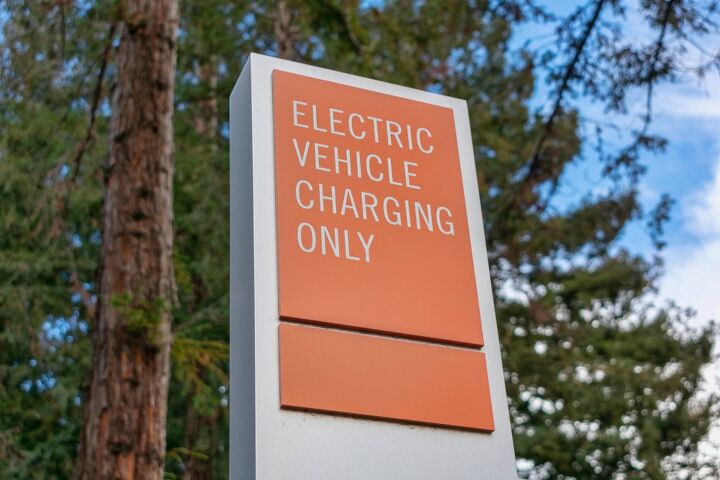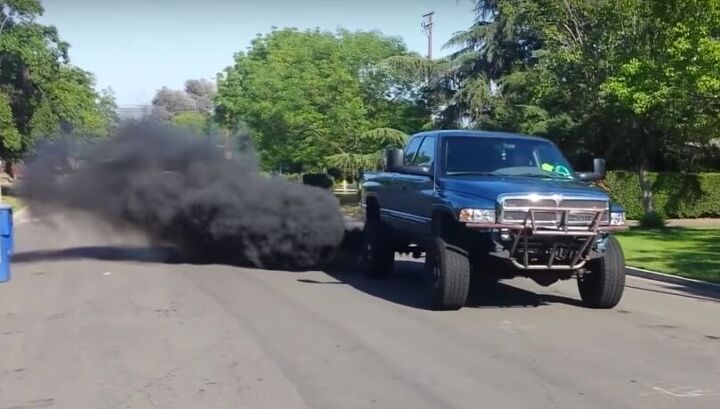#environmentalism
NHTSA Considers Increasing Fines for Emission Violations
The National Highway Traffic Safety Administration is considering increasing penalties for automakers that fail to meet fuel-efficiency requirements. Though this could be considered a restoration of older standards, depending upon your perspective.
Shortly before leaving office, President Donald Trump postponed a regulation from the last days of the Obama administration that would have effectively doubled fines for vehicle manufacturers failing to meet Corporate Average Fuel Economy (CAFE) requirements. Automakers had been complaining that the rule would have dramatically increased operating costs, suggesting that would trickle down to vehicle pricing and give manufacturers selling carbon credits an unfair advantage.
Emerald-Colored Glasses: Just How Green Are EVs?
As the resident sourpuss, I make it my business to complain about every industrial hypocrisy that crosses my path and the automotive sector has kept me so busy that there’s hardly any time left to address my own failings. Though I do have to confess that I sometimes feel guilty about how frequently I’m compelled to gripe about electric vehicles. Provided that you’re willing to work with their charging limitations and less-than-impressive ranges, EVs have a lot to offer even in their current state. But the way they’ve been marketed has been so consistently disingenuous that I often end my days on the cusp of a frustration-induced aneurysm.
The winds appear to be changing, however.
After years of watching the industry bang its head against the wall, the media seems prepared to shift its position. Accelerated adoption of pure electrics doesn’t seem to be happening and too many EV startups have ended up being little more than an opportunity for investors to throw away money. Increasingly fewer people ask me about battery-powered cars in a way that suggests true enthusiasm. Excitement has given way to dubiousness as more people have begun to ponder if electrics are really all they’re cracked up to be.
A Dozen More States Virtue Signaling Over Vehicle Bans
Having noticed that Washington got a bit of publicity for vowing to ban all vehicles reliant on internal combustion after 2030, a dozen other American states decided it would be a good idea to reaffirm their own religious-like commitment to the environment by saying they too will be restricting your choice of automobiles by 2035.
The coalition of states — most of which don’t have a populace that’s dependent on automotive manufacturing for work — also formally asked the Biden administration to introduce standards that would obligate the United States to ban everything that emits smoke within the next fifteen years. Many activist groups are calling it a heroic act, though it’s difficult to recall any parables where the hero went around banning things and also represented an institutional power structure.
European Automakers Think Fuel Taxes Will Increase EV Sales
Undoubtedly eager to improve the take rate of electric vehicles, automakers have a myriad of solutions at their disposal. But the majority have something to do with getting the government involved to futz around with taxes.
Normally, this has to do with making special exceptions for EVs or subsidizing them via rebate programs. But governments seem happy to do this, as increasingly more legislation is advanced that would place restrictions on when and where people will be able to drive internal combustion vehicles, and automakers appear to be getting with the program. We’ve already seen manufacturers choosing sides in America’s gas war and now the Europeans are getting in on the action by demanding higher taxes be imposed on vehicles reliant on gasoline or diesel.
Another One: FedEx Vows to Become Carbon Neutral by 2040
FedEx had kneeled before mankind, vowing to become a carbon-neutral business by 2040. That’s roughly eight years longer than it’ll probably take most of the population to forget that the promise was ever made. But this is the way of the world and we wager it won’t be long before it’s just easier to list the companies and governments that have not made informal, often empty commitments about the environment.
But, before we throw FedEx into the camp of blatant placation, let’s see what it actually has planned.
German Automakers Look to South America for Keystone Lithium Supply
With Europe increasingly fixated on regulating vehicular emissions, German automakers are throwing themselves into electrification like ’90s moms did with Beanie Babies. As with those moms, the investment has yet to pay off. Still, that hasn’t encouraged anyone to change course. Every player understood from the outset that transitioning to EVs was bound to be costly and, with increasingly stringent regulations proposed every month, there aren’t many alternatives.
Volkswagen placed its very existence on electrification after Dieselgate, quickly running into problems with battery suppliers. And while VW claims it’s solved the issue for the next few years, it isn’t out of the woods yet. VW and Daimler have reportedly commissioned a study into sustainable lithium mining in Chile, but it’s already receiving pushback from environmental groups concerned about the delicate nature of the region’s Atacama salt flat — where the metal is found in abundance.
Tesla's German Factory Could Be Delayed So Animals Can Hook Up
Tesla’s planned factory in Germany could face major delays if the manufacturer doesn’t start construction within the next two months. Brandenburg’s Economy Minister, Joerg Steinbach, recently told German outlet Handelsblatt that the 300-hectare area in Grünheide Tesla set aside is subject to environmental regulations that prohibit interfering with the local wildlife’s breeding habits.
These twitterpated critters are not to be interfered with if the company hasn’t started building by mid-March.
Until then, it’s fair game. Once crews finish clearing the land (and leftover ordnance from World War II), they can finish scaring away the animals. However, if Tesla can’t get all of that done in a couple of months and start construction on the factory, it will be forced to delay the entire project another nine months.
Fast Is Past: German Auto Club No Longer Opposes Speed-limited Autobahn
The German equivalent of AAA, Allgemeiner Deutscher Automobil-Club (ADAC), has long been a proponent of a limitless Autobahn. However, the group recently walked back its zeal for the cause amid demands from environmental groups to enact speed limits in a bid to curb emissions.
While most of the Autobahn has the same posted limits you’d find on most North American highways, there are plenty of sections where people can drop the hammer and go as fast as conditions permit. Safety advocates have often raised an eyebrow, encouraging regulators to limit additional sections of the roadway, but universal limits have always been a bridge too far. Now that environmental groups have joined the fray, the issue has garnered a lot more attention.
Los Angeles Has a Green New Deal of Its Own - No ICE Vehicles by 2050
The last decade is littered with announcements from cities, provinces, and states from across the globe, promising to ban internal combustion vehicles by a predetermined date. While the rules and timelines vary quite a bit, the locations are relatively consistent. China and Europe are the most eager to adopt a zero-emission strategy, with California doing most of the promising in North America.
This week, Los Angeles Mayor Eric Garcetti announced the city’s “ Green New Deal.” Styled to resemble the contentious stimulus program sponsored by Rep. Alexandria Ocasio-Cortez (D-NY) and Sen. Ed Markey (D-MA) that shares its name, LA’s plan is similarly concerned with promoting “environmental justice,” equity, green jobs, renewable energy, improved air quality, and sourcing clean water.
Transportation is also a major component of the deal, with the city suggesting that 100 percent of car sales will be zero-emission by 2050 and 50 percent of all trips could be completed by walking, biking, “micro-mobility” (scooters, etc), or public transit — reducing vehicle miles per capita by 45 percent in the same timeframe.
'Artisanal' Child Labor Business Booming, Thanks to Electric Vehicle Renaissance
Electric cars have been praised as the future savior of mankind for quite some time now, but only in the last few years have mainstream automakers promised to drive headlong into EV production. Governments around the globe encourage the transition. The reality of battery production isn’t so clear-cut, however. Unless you make your daily commute in a Mack truck, odds are good that swapping to a sparkly new four-door with a lithium-ion battery isn’t going to be better for the environment.
Currently, it takes substantially more energy to produce an electric car than a conventional internal-combustion model. EVs sourcing their energy from fossil fuel-burning power plants aren’t much better for the environment than something that runs off pump gas. In addition to that, defunct batteries have to be recycled or they become environmental hazards — and no one has quite figured out the best way to do that yet.
There’s also the issue of sourcing the materials for those batteries. EV cells need scarce precious metals like nickel and cobalt. Those materials take a lot of energy to harvest and have, unfortunately, led to an increase in child labor rates in Africa.
Colorado is Smoking Out Coal Rollers; Practice to Be Made Illegal
Rolling coal is one of the more contentious forms of automotive customization, primarily because it’s as much associated with vindictive cruelty as it is with having a good time.
In fact, there are probably more videos on YouTube of modified diesel truck owners blasting cyclists, protesters, activists, and EV drivers with sooty smoke than there are not. Over the last few years, rolling coal has become a way for many to showcase their anti-environmentalist and hard-right viewpoints. However, regardless of your politics, being on the receiving end of a diesel truck intentionally running ultra-rich is obnoxious and several states have attempted to ban the practice.
After three failed attempts, Colorado finally managed to pull it off. While earlier attempts fizzled, mainly due to concerns expressed by the Republican-controlled Senate over how regulations might affect the trucking and agriculture industries, a revised bill better addressed those concerns. Now, law enforcement will undergo training to help differentiate between a smoky work truck and those specifically designed to run rich for the purpose of rolling.
Morrissey Wants GM to Offer Vegan Interiors; GM Says 'How Soon Is Now?'
In a letter addressed to General Motors CEO Mary Barra, renowned complainer singer Morrissey requested that the company offer vegan leather interiors for the Chevrolet Volt and upcoming Bolt EV. The request is part of a PETA campaign aimed at curbing leather production, helping electric car buyers enjoy all of the pleasures associated with animal skin seats without any of the guilt.
However, it turns out that General Motors already had something in the works.
TTAC News Round-up: Tesla Range Rumors Fly, Lada Needs a Miracle, and Nissan Dreams Big
Is Tesla planning a Model S update that squeaks past 300 miles of range?
That, a savior is needed at Lada’s parent company, Nissan wants your future car to be everything, Ford goes all in down under, and pedestrians and cars are meeting frequently … after the break!
Should Americans Fund Fracking?
Imagine growing up in the modern day world and having no future.
No education. No upward mobility. No right to pursue a better life beyond just a few crumbs of financial sustenance.
This is the reality in most Arab countries and former Soviet republics. It’s a world where opportunities are almost non-existent and certain cliques and clans determine who has the exclusive right to get ahead.
I grew up traveling the world in a family business — the food import business, to be exact. I have learned that in the West there is a tendency to believe folks can overcome Herculean odds in the pursuit of that better life, whatever and wherever it may be.
That opportunity just isn’t there in these places where even geniuses can be damned to a life of a terminally squalid environment. It’s a shame. But what if instead of investing billions of dollars in armaments and other forms of support to these idiotic regimes, we tipped the scales of supply and demand a bit in favor of the billions of little guys and little girls?
Let me explain.





























Recent Comments